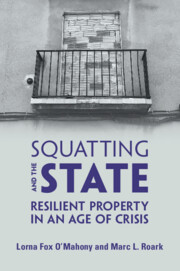
-
Select format
-
- Publisher:
- Cambridge University Press
- Publication date:
- August 2022
- August 2022
- ISBN:
- 9781108767873
- 9781108487740
- 9781108738033
- Dimensions:
- (229 x 152 mm)
- Weight & Pages:
- 0.86kg, 498 Pages
- Dimensions:
- (229 x 152 mm)
- Weight & Pages:
- 0.72kg, 498 Pages
- Subjects:
- Geography, Law, Planning and Urban Geography, Property Law
You may already have access via personal or institutional login- Subjects:
- Geography, Law, Planning and Urban Geography, Property Law
Book description
Squatting and the State offers a new theoretical and methodological approach for analyzing state response to squatting, homelessness, empty land, and housing. Embedded in local, national, and transnational contexts, and reaching beyond conventional property theories, this important work sets out a fresh analytical paradigm for understanding the deep, interlocking problems facing not just the traditional 'victims' of narratives about homelessness and squatting but also a variety of other participants in these conflicts. Against the backdrop of economic, social, and political crises, Squatting and the State offers readers important insights about the changing natures of property, investment, housing, communities, and the multi-level state, and describes the implications of these changes for how we think and talk about property in law.
Awards
Long-listed, 2025 Book Prize, Inner Temple
Reviews
‘This timely and important book compels us to rethink how law structures property relations between individuals, institutions, and the state. It is a must-read for anyone interested in reforming property law to be more responsive to our collective human need for resilience.’
Martha Albertson Fineman - Robert W Woodruff Professor of Law, Emory University, Founding Director of the Vulnerability and the Human Condition Initiative
‘With the unfurling of seemingly perpetual socio-economic, health, and ecological crises destabilizing long-held conceptions of law, property theory is overdue for a reckoning with the imbrication of the state’s vulnerability and property’s role in individual and institutional resilience. Fox O'Mahony and Roark’s erudite and innovative guide to an emerging world offers a force and moral clarity that demand recognition.’
Nestor M. Davidson - Albert A. Walsh Professor of Real Estate, Land Use and Property Law, Urban Law Center, Fordham Law School
‘The authors have produced a monumental contribution to property theory. States should draw inspiration from this monograph as they respond to the polycentric demands of housing crises at multiple levels using an array of resources. Resilience thinking and adaptability will become the baseline in housing scholarship for years to come.’
Gustav Muller - Associate Professor of Private Law, University of Pretoria
‘This book is excellent for collections on legal theory and comparative law. … Recommended.’
D. Schultz Source: Choice
Contents
Metrics
Altmetric attention score
Full text views
Full text views help Loading metrics...
Loading metrics...
* Views captured on Cambridge Core between #date#. This data will be updated every 24 hours.
Usage data cannot currently be displayed.
Accessibility standard: Unknown
Why this information is here
This section outlines the accessibility features of this content - including support for screen readers, full keyboard navigation and high-contrast display options. This may not be relevant for you.
Accessibility Information
Accessibility compliance for the PDF of this book is currently unknown and may be updated in the future.


